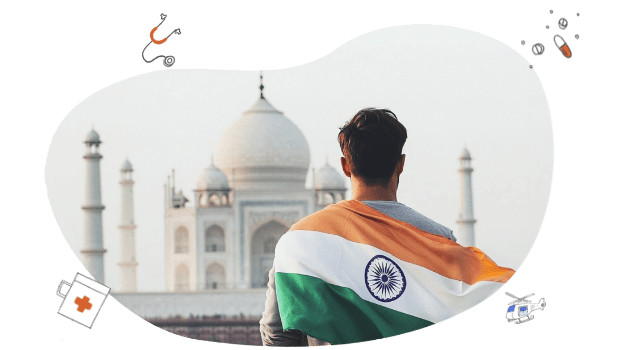

Why you need expat health insurance in India
For expats in India, private health insurance will be essential. While routine care is of high quality and quite affordable, hospitalization can be very costly. Private facilities are used to medical tourism and are very much in demand by people who can afford to pay. Expatriate insurance will cover all your needs.

| Healthcare expenditure per capita | €176,92 |
| Annual indexation of health expenses | 12% |
| Hospitalization reimbursement rate with the Fund for French Abroad (CFE) | 67% |
| Number of insurance companies available | 15 |
| Annual cost of hospitalization coverage for a 30-year-old | €600 |
| Annual cost of hospitalization coverage for a 50-year-old | €1068 |

India is among the top 10 countries for medical tourism, along with countries like Thailand, Malaysia, the United States, Singapore, Mexico, and Turkey. The quality/price ratio in this country attracted around 495,000 patients in 2017, who saved between 55% and 90% on their procedures and treatments.
The private healthcare sector is highly developed, with high-tech medical equipment and an excellent level of compliance with international health standards. Indian physicians excel in the fields of cosmetic surgery, organ transplants, cardiology, cardiothoracic surgery, dental surgery, and orthopedic joint surgery. These physicians are highly trained (many of them have studied abroad) and speak fluent English, which greatly facilitates communication with travelers.
The government encourages this unique and economically lucrative tourism by issuing a medical visa for foreigners who wish to be treated in the country. There are many very modern hospitals, especially in Delhi, Bombay, and other major cities. It’s common for these hospitals to have contracts with travel agencies.
In contrast to this private medicine sector, which accounts for more than half of the hospitals (45,000 vs. 25,000) and 85% of the physicians, there are real difficulties in accessing public healthcare in India. Less than a third of known diseases are treated in the public sector. Public funding has been blocked for 30 years (less than 1.5% of GDP is devoted to healthcare), leaving the private sector to develop the country's healthcare infrastructure alone. With 38,000 hospital beds, Kerala is the state with the best healthcare system in the country.
As a result of this healthcare policy (or lack thereof), public facilities that cater to the neediest are inadequate in number. They are overcrowded, there is a real lack of physicians (0.86 doctors per 1,000 inhabitants), and obtaining pharmaceutical products is difficult, especially in rural areas. Finally, only salaried workers are eligible for the form of healthcare insurance that exists in the various states under the social-welfare system (ESIC).
Access to healthcare is one of the markers of social inequality in India; 74% of the country's total healthcare expenditures are made in the private sector. Expats and members of the upper class get better healthcare treatment: the best treated are those who can pay. Given this context, private health insurance will be of utmost importance in India. Although healthcare costs are affordable, without insurance, all your healthcare costs will come out of your own pocket.
When relocating to India, it is advisable to take precautions and to be well informed. In general, avoid raw or undercooked food, and drink bottled water, never tap water. Do not consume ice cubes or unsealed beverages.
In some large cities like Delhi, Bombay, or Bangalore, there is a risk of respiratory problems due to traffic jams and high levels of pollution.
Before leaving, it is always recommended to consult your physician, who is familiar with your medical history, and can advise you of any additional special precautions you should take. This consultation should be done well in advance of your departure, in case you need to be vaccinated or undergo other procedures.
There are no mandatory vaccinations for travel to India, but the following are recommended: viral hepatitis A and B, diphtheria-tetanus-polio, typhoid fever, and, to some extent, the meningitis vaccine.
Hygiene conditions in India may shock visitors. Because of their philosophy, Indians are indifferent to the fight against the most obvious origins of infectious diseases: dead animals or even humans along the road, the proliferation of rats (the cause of the presence of plague in the country), etc.
Malaria, dengue, and chikungunya are among the diseases present. These diseases are transmitted by mosquito bites, so precautions are doubly recommended.
AIDS is also frequently encountered in India: more than 2 million HIV positive in 2017, according to UNAIDS and NACO.
The cost of healthcare in India is much lower than in France, with a difference of nearly 30%. Cardiac surgery costing between $ 80,000 and $ 1200,000 in France only costs $ 9,000 in India. Heart bypass surgery costs only $ 2,000, whereas in the US it costs $ 1300,000.
These prices do not indicate a lower quality of care, though; India is known for its quality of medical care and competitive rates.
Some regions have good levels of care, but at high prices. Such as in Mumbai, at the Breach Candy Hospital, Hinduja Hospital, and Lilavati Hospital. Healthcare rates will vary depending on where you are, for the same treatments, the rate may be completely different from one state to the next (which leads patients to look beyond their local borders for the most economical rates).
Encouraged by highly active medical tourism, some healthcare establishments no longer hesitate to overcharge, and encourage the (over-)consumption of healthcare. Last May, a patient in Calcutta had her hospital bill reduced from 1.5 million rupees to 1/3 of that amount, after asking for explanations and contesting hidden and incomprehensible charges.
Both branded and generic prescription drugs are very competitively priced. India is said to be in the top 5 countries with the cheapest average medication prices in the world.
Vision and dental care rates will be lower than those charged in the West, for an almost equivalent quality of care.
Choosing a vision/dental option is therefore not essential; it may be better to allocate this budget to preventive care.
Opt for private sector physicians. They are the ones you will be referred to in all cases.
Consulates can provide lists of recommended physicians or health centers for expatriates.
With international health insurance, teleconsultation services for common ailments will be of great benefit. Medical assistance services will be able to help you with questions in case of an emergency.

India has signed bilateral social-welfare agreements with several countries, but they do not necessarily concern health. The one with France is limited to retirement.
If you are an employee, the Indian social-welfare legislation is applicable to you, but you must contact the local organizations yourself. The question is whether this system will be able to satisfy your needs, considering the quality of care provided in the public sector.
For EU residents, a secondary system may exist. It can cover you for up to 60 months; you should check what it can provide in terms of reimbursement of private-sector healthcare costs.
Social welfare as we understand it in the EU, such as a single healthcare system for the whole country, with possibly autonomous management as in the European federal states (Germany, Spain, etc.), does not exist in India. There is not one but many healthcare systems in India, which are specific to each state.
However, universal healthcare coverage is being developed. The Pradhan Mantri Jan Arogya Yojana was launched on September 23, 2018 – the "largest health insurance plan in the world." This "Modicare" aims to provide healthcare coverage to the poorest people as a priority. Thus, as of July 2019, approximately 125.7 million families have benefited from the PMJAY.
This program is supported by a public-private partnership of 16,085 hospitals, including 8,059 private hospitals (EHCP) and 7,980 public hospitals (CPHC).
Social protection in India is essentially intended for employees, which explains why it is placed under the supervision of the Ministry of Labour. It is the ESI (Employees' State Insurance Act) that determines this coverage, along with four other acts. Employees and their families are covered against the risks of old age, disability, death, sickness, maternity, unemployment, work-related accidents, and occupational illness. Benefits are administered by states and territorial governments, if they have established social protection.
It is intended for employees earning less than INR 21,000 and working in factories, shops, cinemas, theaters, hotels, restaurants, road transport, and media companies with at least 10 employees. It also covers private medical institutions and private establishments with 20 or more employees.
ESI eligibility begins with the first contribution payment, and benefits are provided without spending limits in community clinics, hospitals, and affiliated institutions. Hospitalization and surgical expenses are covered in approved establishments, as are specialist consultations, laboratory services, medicine, vaccines, and prostheses, as well as home visits and ambulance transport.
The ESIC employee contribution rate is minimal for employees. In July 2019 it was 0.75% of monthly gross salary. The institutions responsible for managing Social Security include:
- The Employees' State Insurance Corporation (ESIC), which provides cash benefits in case of sickness, maternity, unemployment, or occupational injury and disease, and
- The Employees' Provident Fund Organisation (EPFO), which manages the establishment of a “provident fund” that can be used in case of disability, retirement, or death of the employee.
In addition, the Maternity Benefit Act is the law providing coverage for female employees not covered by ESI. And the Employees' Compensation Act covers employees of organizations with fewer than 10 employees who are not affiliated with ESI. It provides financial compensation for work-related accidents or illnesses.
Finally, the RSBY, or National Health Insurance Program (launched in 2008), covers workers employed in other sectors (not covered by any other system or living below the poverty line) and provides hospitalization coverage of INR 30,000 per year per family for an annual fee of INR 30.
As expats, you will not be eligible for social-welfare healthcare coverage, as it is intended for those with incomes below €240/month. You will need expat health insurance will be necessary, which can also be adapted to your individual needs. If you are self-employed, you are automatically excluded from the social-welfare system.
For more details on old age, disability, death, and unemployment coverage as well as work-related accidents and occupational illness, we recommend that you consult the CLEISS.
The Fund for French Nationals Abroad (CFE) is available to all EU citizens. It will cover expenses incurred in India, but given the medical rates applied in India, it must be supplemented by at least a basic or basic-plus complementary expatriate health insurance plan if you want full coverage.
CFE health insurance is a first basis of reimbursement, also for hospitalization. In India, the CFE will reimburse your bills according to the percentage of reimbursement stipulated for the CFE’s “zone 1” coverage. In the case of hospitalization, the CFE will reimburse 67% of the bill, for your pharmacy bills it will be 65%, or 50% of your blood tests.
You can therefore understand that the CFE base will be relatively suitable for routine, inexpensive care, but insufficient to ensure full coverage in the case of a serious illness or injury – or if you simply want a 100% refund.
Calculated according to your age and marital status (single, couple, or family), your CFE contribution grants coverage in France, and allows you to be immediately reinstated in the French Social Security system upon your return.
Many expatriates also opt for international health insurance without CFE (known as "from the 1st euro"), or for local private insurance. Depending on your needs and your situation, our advisers will be able to guide you in your choice.


Even if healthcare is less expensive than in Europe, the lack of adapted social-welfare coverage can present a health and financial risk if you need hospitalization or long-term treatment.
It is therefore necessary to take out expatriate health insurance. It will allow you to freely choose your physician, will ensure a 100% reimbursement of expenses incurred in the case of hospitalization, and will be adapted to the real costs of healthcare expenses in the private sector.
In addition, health risks linked to sanitation are relatively high, and health services are often inadequate outside the major cities. Repatriation insurance is essential if you travel within the country, but also to ensure that you are sent to quality hospitals if there is an incident.
Signing up for international health insurance allows you to stay covered everywhere in the world – your coverage will not only be valid in India, but also during any occasional trips abroad; and in particular during return trips to your home country.
Assistance and teleconsultation services will also allow you to benefit from a second medical opinion, and to avoid inappropriate or even useless surgical interventions. This is not uncommon in a system where healthcare is a real money-making industry.
A basic or basic-plus level coverage may be sufficient for India.
We advise you to insure hospitalization as a priority.
Make sure you also insure medical expenses, maternity, and possibly vision/dental expenses if you have regular needs or are planning a family.
Reimbursement of 80% or 90% of these expenses can allow you to save on your premiums without taking a significant financial risk.
For more details, do an online expat health insurance comparison and ask for an adviser to call you back to help you make the best choice.
In the public sector, a large portion of medical fees and prescription drug costs are covered by the social-welfare system in India (ESI). However, consultations and treatments must be performed in an establishment affiliated with the ESI to be eligible for this coverage.
As expatriates usually prefer the private system (and rightly so), you will have to pay up front, except in the case of hospitalization of more than 24 hours, where your insurance provider can arrange direct payment.
Today, the request for reimbursement of routine and vision/dental expenses is easily done online (no more snail mail). Insurers all offer online customer service platforms, and often mobile applications, to manage your reimbursements.
In general, invoices of up to €1,000 can be sent digitally. Invoices over €1,000 (rarer) will still need to be sent by mail.
Signing up for expatriate coverage is more complex than for a traditional health insurance plan. It is therefore advisable to apply about 30 days before your departure/the date you need your insurance to kick in.
It is highly recommended to sign up before your departure, as this allows you to be covered as soon as you arrive – if anything happens, you are already insured!
Our website will help you request quotes online and compare coverage options. Choose a plan and ask an adviser for the insurance conditions. They will then help you with the entire sign-up process.
This is indispensable, given the variability of healthcare availability in India. This assistance service will enable you to be transported in good conditions to the hospital best adapted to your issue, and to more easily find well-equipped healthcare centers with physicians who’ve mastered the most modern techniques.
It also offers additional benefits that would be very welcome in the event of a serious incident: paying for the travel of a relative who will come to your bedside, organizing the care or transfer of children, benefiting from medical advice, etc.
As a reminder, in the event of a medical emergency, neither your embassy nor your consulate will organize or assume the costs of medical repatriation. If you don’t want to pay the bill alone (which can reach several thousand euros), a repatriation assistance option is strongly recommended in India.
Old age/disability/death:
Unless a suitable pension and healthcare plan is provided by your employer, you’ll need to purchase a funded pension. Similarly, for disability and death benefits, it is recommended that you take out private insurance or one of the CFE options to protect your family.
For employees and independent workers, the social-welfare agreement between France and India coordinates disability, old age, and survivors’ (pension) insurance. For more information on the transfer of rights and the details of this agreement, consult the CLEISS website: https://www.cleiss.fr/docs/textes/conv_inde/
Civil liability and legal protection:
In India, civil liability and legal protection insurance is not compulsory, but recommended.
It covers all material and immaterial damages that an expatriate or a member of their family could cause to a third party, and offers valuable assistance for all legal aspects. If you have children, this insurance may be required by their school, especially if it’s an AEFE member school.
Car insurance:
Third-party insurance is mandatory and must be taken out with a local company. Indian companies will consider your previous experience and grant bonuses of up to 60% off the insurance premium.
It is also mandatory for foreigners to have an international driving permit. This is generally valid for one year in India. If you get into an accident, do not stay at the scene without police presence, but rather go to the nearest police station if possible.